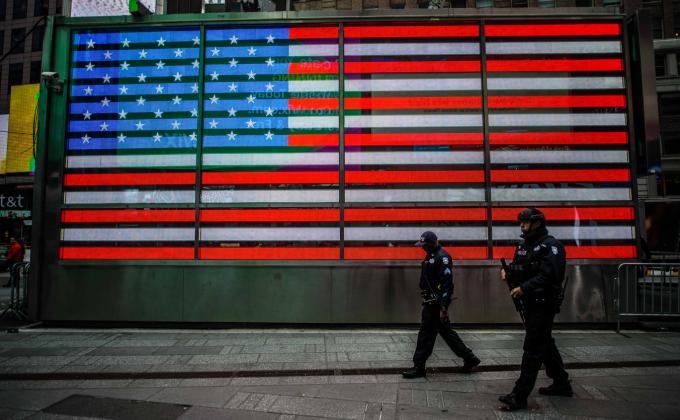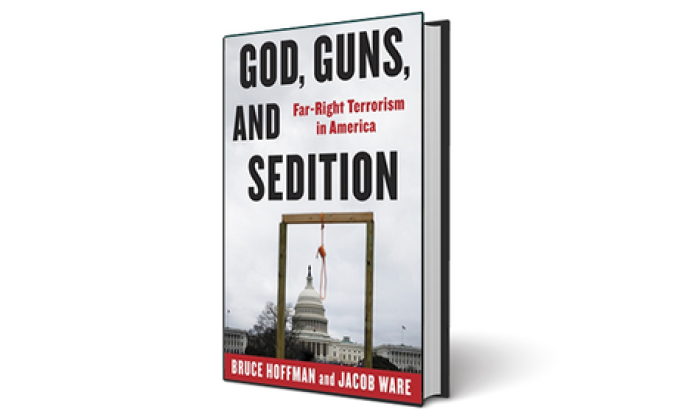The QAnon conspiracy emerged on 28 October 2017, when a user named “Q” posted what were purported to be highly classified government secrets on 4chan’s /pol/ (politically incorrect) discussion board, contributing to a thread discussing the Mueller investigation into Russian interference in the 2016 United States (US) elections. Notably, Q’s claim of having special access to government secrets is not unique; rather, it is part of a wider “anon” genre comprising anonymous users of discussion boards who claim to be government officials party to secret, and usually highly inflammatory, information. Both before and in the early days of “Q,” for example, there were several 4chan users that claimed to have special government access. In October 2020, three years following the emergence of “Q,” there remains no consensus as to who the original “Q” was—let alone who manages its output at present.
QAnon is a conspiratorial and anti-establishment ideology rooted in a quasi-apocalyptic desire to destroy the existing, corrupt world and usher in a promised golden age. Adherents believe that American President Donald Trump is waging a covert war against a sinister cabal of satanic pedophiles, and that in the near future, there will be a great reckoning – what adherents call “The Storm” – when these evil deep state actors will be rounded up and arrested. QAnon’s diversified and increasingly broad base of support means that it continually absorbs other conspiracy theories that have fed into other globalist anti-government movements, among them the beliefs of 1990s militia movements about the ‘New World Order’ and the anti-government apocalypticism and religious fervor of the Branch Davidians.
Recent criminal cases show how QAnon has contributed to the radicalisation of a number of ideologically motivated violent extremists. In light of this, in 2019 a Federal Bureau of Investigation (FBI) bulletin stated that QAnon and other fringe conspiracy theories could “very likely motivate some domestic extremists, wholly or in part, to commit criminal and sometimes violent activity” and noted that “one key assumption driving these assessments is that certain conspiracy theory narratives tacitly support or legitimise violent action.”
QAnon followers have already engaged in several acts of violence and the time between radicalisation and mobilisation can be very short with cases sometimes measured in days, as we showed in a recent CTC Sentinel article. If more individuals with greater organizational skills and operational acumen seek to pursue QAnon’s agenda, it could eventually lead to more significant threats to public security and become a more impactful domestic terrorism threat.
Election Violence: Charting the Possibilities
It is no exaggeration to say that irrespective of the outcome in the US election, several socio-political dynamics that currently exist will continue to be with us into the future. At the forefront is the continued second and third order impacts of the COVID-19 pandemic. The pandemic, the subsequent lockdown, and the economic fallout has had a major impact on individuals and their psychological and social well-being. The normalcy of day-to-day life, which used to anchor individuals in their bodies, their families, and their communities was largely thrown in flux. Taken for granted aspects of our life – going to work, dropping kids off at school, and the like – has required significant rethinking and reconfiguration. Relatedly, trust in science, the media, medicine, and other expert systems has been undermined by the pandemic, and the seeming inability of these experts to get it under control. The pandemic has caused what sociologist Emile Durkheim called a sense of “anomie”, or rootlessness, which has opened the way for increased conspiratorial thinking and the belief that those tasked with protecting us are, at best, not up to the task, or, at worst, malevolent actors. Many of these second and third order consequences of the pandemic will outlive the election and will impact the next administration as well.
More immediately, the pandemic has changed the way the election itself is being carried out, with a large increase in mail-in-ballots, with different states instituting different rules around when ballots need to arrive in order to be counted. We could, in effect, see delays in final election results. For QAnon adherents, the narratives around this have already led to social polarisation and many, parroting Donald Trump, constantly refer to ballot tampering and election rigging, essentially bringing into question the validity of the 2020 election. If there are delays or other complications with the final election result, it will likely feed into their pre-existing belief in the invalidity of the election, and foster a chaotic environment that could lead to violence. Responses could range from mass protests, armed individuals patrolling protest sites (like Kyle Rittenhouse) or around government buildings, to even lone-actor violence.
It is also very likely that there will be continued anti-mask protests that will feed into the anti-establishment narrative of QAnon and bolster their worldview. Additionally, with a possible vaccine on the horizon, there will be challenges with respect to administering the vaccine to anti-vaccine communities that have increasingly meshed with QAnon in 2020. QAnon adherents do not believe that the pandemic is real and believe in multiple conspiracies about what the vaccine is, and its intended goals. As such, even a Trump victory would not necessarily make administering vaccines any easier, as QAnon followers have not reconciled the fact that Trump has been pushing for a mass distribution of vaccines when they are ready. Some QAnon adherents have instead argued that vaccine distribution is a ploy for mass arrests of deep state agents.
In the case of a Joe Biden victory, QAnon would likely not trust a vaccine created and distributed under the new administration, as this would be interpreted as a play from the deep state to destroy those fighting against them and a way to further institute population control. As the vaccine has been folded into QAnon’s war narrative, there is a possibility that this may lead to QAnon adherents targeting vaccination stations or medical staff.
Additionally, the continued tensions in the US between civil rights protests against police killings is another likely threat vector that will continue to exist no matter the winner of the election. For QAnon adherents, the Black Lives Matter movement and Antifa are soldiers of the deep state destabilising the nation. If these tensions escalate further, there is a strong likelihood that we could see another Charlottesville or Benjamin Hung-style incident in the coming months.
Looking at the QAnon movement in particular, we turn now to examining likely reactions by adherents to both possibilities in the upcoming election.
Scenario 1: A Trump Victory
If the outcome of the 2020 election is a Trump victory, there could be instances of violence, as QAnon followers undertake an urgent campaign—this could be done individually, as small organized group, or as part of a more extreme movement that has recruited QAnon followers—to bring about the arrest of supposed corrupt elites, celebrities, and the deep state as a whole. QAnon adherents will be vindicated in their beliefs and they will consider a Trump victory to be a great triumph against the deep state. QAnon followers will continue to find fertile ground for growth and recruitment.
With the continued impact of COVID-19 on the US population and considering the exponential growth and mobilisation of QAnon in 2020, continued agitation by adherents is a distinct possibility. Social polarisation, economic uncertainty, a health crisis, and political instability will fuel potential domestic criminality and acts of terrorism.
The domestic disinformation environment under a renewed Trump administration will continue to feed into the fear of QAnon adherents and present them with targets to act against. It is important to remember that the QAnon ideology permits the development of symbolic resources that enable humans to define and address the problem of evil, by giving QAnon a definable enemy against which to struggle.
We have already seen QAnon adherents burn down cell towers because they thought they caused COVID-19, and we have seen QAnon adherents commit violent crimes in support of their ideology since 2017. Under a victorious Trump administration, failures and challenges to the administration will continue to be projected outward and blamed on others. As such, some form of violence is likely in the short to medium term but very likely in the long term.
Scenario 2: A Biden Victory
In the case of a Biden victory, QAnon adherents will likely interpret the defeat of Trump as a major lost opportunity to save enslaved children and to save the country – one that cannot be abandoned without a fight. While it stands to reason, based on an understanding of the QAnon worldview, that the loss of Trump might cause many of these individuals to abandon the movement as a whole, we believe this is highly unlikely. For QAnon adherents, Biden’s victory will be clear evidence that the deep state has won the battle, but not the war – that they will now need to fight harder than ever before, since their ally in the White House has been removed. The fight against the deep state, we argue, will be cast as a longer battle against the forces of evil, one that started before Trump and will continue after him.
There is, of course, also a near-term possibility of violence. We argue that this largely depends on how Trump would potentially respond to electoral defeat. If he graciously concedes victory to Biden, makes a speech bringing the country together, and initiates a peaceful transfer of power, some of the polarisation he has helped produce might be quelled. But, based on his behavior since coming into office, it is not entirely clear if Trump is capable of rising above the situation and putting the nation above himself.
Though some QAnon adherents may simply want to continue the information war, others will likely see a Trump defeat as evidence that there is no political solution to defeating the deep state and come to see violence as the only option.
Conclusion
As is evident from our discussion above, and as many other researchers have also noted, the nature of the debate around what the 2020 election may bring is largely unprecedented. Rarely in the recent past have analysts and politicians seriously debated the potential for electoral violence, the possibility that a losing candidate may not leave office, and other threats to the integrity of American democracy. The 2020 election has been fundamentally different in this regard and continues to worry commentators and citizens alike.
We have, in this brief paper, provided a bird’s eye view of some of the fault lines we see particularly in relation to conspiratorial social movements like QAnon. There are, of course, other dynamics at play in the US election – racial injustice, voter suppression, and foreign influence, to name a few – which we have not touched upon but deserve sustained treatment.
As we head into an important election, in an America polarised like never before in the recent past, we can only hope that our predictions are wrong. The opposite will have profound consequences for generations to come.









